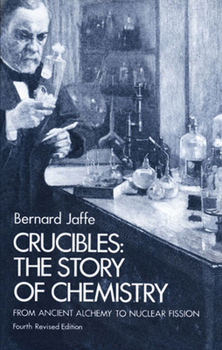Crucibles: The Story of Chemistry from Ancient Alchemy to Nuclear Fission
Select Format
Select Condition 
Book Overview
This book is a classic in the field of popular science. Standard reading since the 1930s, it is one of the few historeis of chemistry to concentrate on the lives of the great chemists. Through these dramatic and human stories, it gives an authoritative and entertaining account of the great discoveries and advances in this scientific field. After many printings in three previous editions, this book has been newly revised by the author for this fourth edition. Beginning with Trevisan and his lifelong search for the "philosopher's stone," the author narrates the lives and discoveries of such towering figures as Paracelsus and his chemical treatment of disease; Priestley looking for phlogiston and finding oxygen and carbon dioxide, Lavoisier creating a new language of chemistry; Dalton and his Atomic Theory; Avogadro and the idea of molecules, Mendeleeff arranging the table of elements under his Periodic Law; the Curies isolating radium; Thomson discovering the electron; Moseley and his Law of Atomic Numbers; Lawrence and the construction of the cyclotron; and more. Probably the most dramatic chapter in the book, the account of the development of nuclear fission, ends the story of chemistry at its most monumental achievement. A final chapter discusses some of the consequences of nuclear fission, the discovery of nuclear fusion, and the recent work with subatomic particles. Bernard Jaffe is the author of many other science books and several science textbooks. Upon the original publication of this book, Mr. Jaffe received the Francis Bacon Award for the Humanizing of Knowledge. The American Chemical Society's History of Chemistry Division honored him in 1973 with its Dexter Award for "distinguished achievement in the history of chemistry."
Format:Paperback
Language:English
ISBN:0486233421
ISBN13:9780486233420
Release Date:June 1976
Publisher:Dover Publications
Length:384 Pages
Weight:0.90 lbs.
Dimensions:0.8" x 5.4" x 8.5"
Customer Reviews
3 ratings
One of the finest books on the history of science
Published by Thriftbooks.com User , 18 years ago
This is one of the finest books on the history of science I have ever read. Each scientist appears larger than life - even their warts and flaws are the size of mountains. This is the history of chemistry told on the large screen, technicolor, and surround sound, as heroic as any military or political history. I'll be re-reading this book 20 years from now.
still a great introduction to chemistry
Published by Thriftbooks.com User , 19 years ago
Not everyone likes to jump into a field with a basic textbook. Crucibles tells the story of modern chemistry and atomic theory in the form of a series of biographical vignettes with an emphasis on chemistry. It starts with the ancients and covers a lot of ground. I found it rather fascinating as a kid, but I still think it's pretty good as an introduction.
Good information - difficult style
Published by Thriftbooks.com User , 22 years ago
I have read and reread this book several times and use it in teaching honors and AP Chemistry on the high school level, and have required my students to read it to bolster their knowledge of the history of chemistry. It is an excellent book, but the writing style is somewhat difficult for high school students, even the higher performing ones. Because of this, I have added some more recent books written in a more engaging style for my students to choose from. I would still recommend this book to those interested in the history of chemistry, but I would also recommend others as well, including PROMETHEANS IN THE LAB by McGrayne and UNCLE TUNGSTEN by Sacks.






